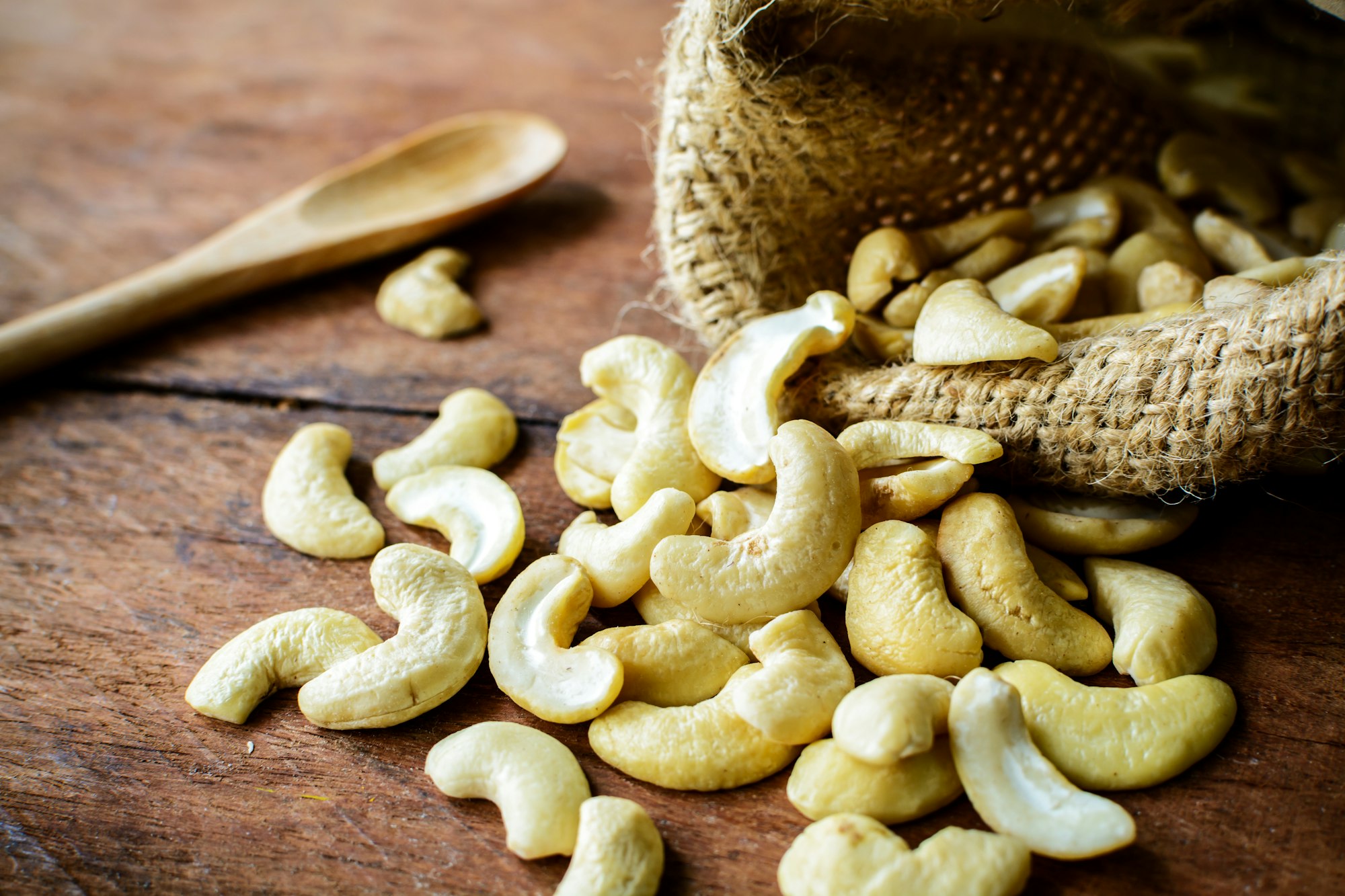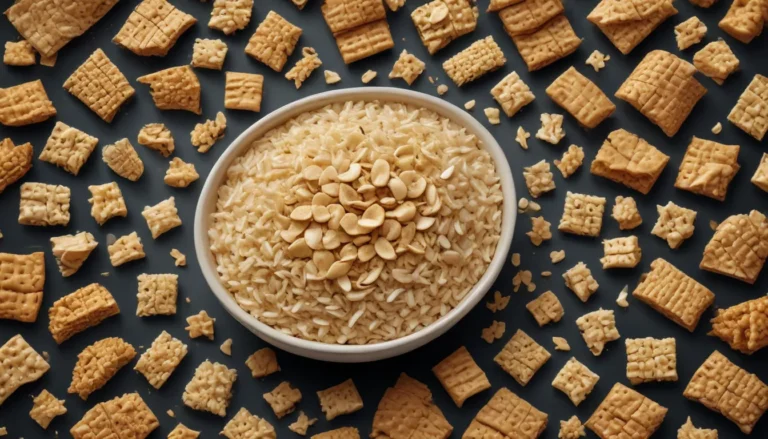The pictures in our articles might not always show exactly what the text is talking about. We use these images to make the article more interesting and eye-catching. They are there to add to the text, but not to replace it or show every detail.
Cashews, with their distinctive kidney shape and creamy texture, have captured the hearts and taste buds of people worldwide. But there's much more to these delightful seeds than meets the eye. Join us as we explore 16 fascinating facts about cashews, uncovering their unique origins, impressive health benefits, and versatile culinary applications.
1. Cashews Are Not Actually Nuts
Contrary to popular belief, cashews are not true nuts but rather seeds. These kidney-shaped delights grow attached to the bottom of the cashew apple, a fleshy fruit native to Brazil. This unique growth pattern sets cashews apart from true nuts like almonds or walnuts, which grow within a shell or husk.
2. The Cashew Tree’s Impressive Stature
The cashew tree, scientifically known as Anacardium occidentale, is a sight to behold in tropical landscapes. These majestic trees can reach heights of up to 50 feet, boasting thick trunks and sprawling branches. The cashew apple, often overlooked in favor of its more famous seed, is a juicy, pear-shaped fruit with a sweet flavor and high vitamin C content.
3. Cashews’ Journey from Brazil to Global Popularity

The story of cashews' global spread is a fascinating tale of exploration and trade. Portuguese explorers discovered these versatile seeds in Brazil during the 16th century and quickly recognized their potential. They introduced cashews to other tropical regions, including India and Africa, where the trees thrived in the warm climates. Today, major cashew-producing countries include:
- Vietnam
- India
- Nigeria
- Ivory Coast
- Brazil
4. Nutritional Powerhouse in a Small Package
When it comes to nutrition, cashews pack a powerful punch. These small seeds are dense with essential nutrients, making them a valuable addition to any diet. A single ounce (about 28 grams) of cashews provides:
- 157 calories
- 5 grams of protein
- 12 grams of healthy fats
- 9 grams of carbohydrates (including 1 gram of fiber)
5. Rich in Essential Minerals
Cashews are particularly notable for their mineral content. They're an excellent source of:
- Copper (62% of the Daily Value)
- Magnesium (20% of the DV)
- Phosphorus (18% of the DV)
- Zinc (15% of the DV)
- Iron (10% of the DV)
These minerals play crucial roles in various bodily functions, from supporting bone health to boosting immune system function.
6. Heart-Healthy Properties
One of the most important facts about cashews is their potential to promote heart health. The healthy fats in cashews, primarily monounsaturated and polyunsaturated fats, can help lower bad cholesterol (LDL) levels and reduce the risk of heart disease. Additionally, cashews are rich in antioxidants that combat oxidative stress and inflammation, further supporting cardiovascular health.
7. Cashews Support Bone Health
The high magnesium and phosphorus content in cashews makes them excellent for maintaining strong bones. These minerals are essential for bone density and strength, contributing to overall skeletal health. Regular consumption of cashews as part of a balanced diet can help support long-term bone health.
8. Weight Management Benefits
Despite being calorie-dense, cashews can be a valuable ally in weight management. The combination of protein, healthy fats, and fiber in cashews promotes satiety, helping you feel full longer. This can potentially reduce overall calorie intake and support weight management goals. Moreover, cashews have a low glycemic index, which helps stabilize blood sugar levels and prevent sudden spikes in hunger.
9. The Toxic Shell Mystery
One of the lesser-known facts about cashews is the presence of a toxic compound in their shells. The shells contain urushiol, the same irritant found in poison ivy, which can cause skin irritation and allergic reactions. This is why cashews are never sold in their raw, unshelled form to consumers.
10. Careful Processing for Safe Consumption
The journey from tree to table involves several careful steps to ensure cashews are safe for consumption:
This meticulous process explains why cashews are often more expensive than other nuts or seeds.
11. Culinary Versatility
Cashews are true culinary chameleons, adapting to a wide range of dishes and preparations. They can be enjoyed raw or roasted as a snack, transformed into creamy cashew butter, or used as a base for dairy-free milk alternatives. In vegan cuisine, cashews are prized for their ability to create rich, creamy textures in desserts, cheesecakes, and savory sauces.
12. Global Culinary Influence
These adaptable seeds have found their way into dishes around the world. In Indian cuisine, cashews are used in rich curries and decadent desserts. Thai dishes often feature cashews for added crunch and flavor in stir-fries. Western cuisine embraces cashews in trail mixes, as a salad topping, and in various baked goods.
13. Potential Anti-Cancer Properties
Among the most intriguing facts about cashews is their potential role in cancer prevention. Rich in antioxidants, cashews help combat free radicals in the body, which may reduce the risk of certain types of cancer, including colon cancer. While more research is needed, the overall health benefits of cashews make them a worthy addition to a balanced, cancer-preventive diet.
14. Brain Health Boost
The high magnesium content in cashews contributes to cognitive function and overall brain health. Magnesium plays a crucial role in neurotransmitter function and may help prevent age-related cognitive decline. Regular consumption of cashews, as part of a varied diet, could support long-term brain health and mental acuity.
15. Eye Health Support
Cashews offer benefits for vision health, thanks to their rich nutrient profile. They contain antioxidants that protect against eye diseases and are rich in zinc, which is essential for maintaining healthy eyes. Including cashews in your diet may contribute to preventing age-related macular degeneration and other eye conditions.
16. Stress Relief Properties
Here's a surprising fact about cashews: they may help you relax! Cashews are high in tryptophan, an amino acid that aids in the production of serotonin, often referred to as the "feel-good" neurotransmitter. By potentially boosting serotonin levels, cashews may help reduce stress and promote a sense of well-being.
Embracing Cashews in Your Diet
With these fascinating facts about cashews in mind, it's clear that these versatile seeds offer much more than just a satisfying crunch. From their unique growth process to their impressive nutritional profile and wide-ranging health benefits, cashews have rightfully earned their place as a beloved food worldwide.
To incorporate more cashews into your diet, consider:
- Adding them to your morning oatmeal or yogurt
- Using cashew butter as a spread on whole-grain toast
- Incorporating them into homemade trail mixes or granola
- Blending them into smoothies for added creaminess and nutrition
- Experimenting with cashew-based sauces in your cooking
Remember to enjoy cashews in moderation as part of a balanced diet. While they offer numerous health benefits, they are also calorie-dense. If you have nut allergies, consult with a healthcare professional before adding cashews to your diet.
By embracing the many facets of cashews – from their rich history to their nutritional prowess – you can enjoy these delightful seeds with a newfound appreciation. Let these facts about cashews inspire you to explore new ways to incorporate this nutritional powerhouse into your daily life, savoring both their taste and their health-promoting properties.






